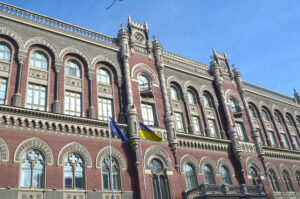
The National Bank of Ukraine (NBU) has raised the country’s international reserves forecast for the end of 2023 to $34.5 billion from $27 billion in its January forecast.
“In total, receipts from international partners may exceed $42 billion this year. Receipts from partners, in particular, will boost international reserves to more than $35 billion at the end of this year,” NBU Governor Andriy Pyshny said Thursday, presenting the updated macro forecast.
The National Bank expects reserves to reach $36.1 billion at the end of 2024, while previously it had expected $31 billion.
According to the updated forecast, the estimate of the current account deficit is improved this year to $13.5 billion from $20.4 billion, but worsened next year to $10.6 billion from $8.4 billion, while last year its surplus was $8 billion.
The NBU points out that the persistence of a significant current account deficit in 2023, in particular due to increased imports amid a gradual recovery of domestic demand, the costs of a significant number of forced Ukrainian migrants abroad and still restrained exports as a result of declining harvests and limited logistics routes. At the same time, the arrival of international aid will offset these factors, the regulator added.
“The net inflow of currency to Ukraine remains due to significant volumes of international aid. This will strengthen the NBU’s ability to further maintain exchange rate stability and gradually ease currency restrictions,” the NBU noted.

The National Bank of Ukraine (NBU) has started assessing the soundness of 20 banks and the banking system, the regulator’s press service said on Wednesday.
According to the report, the assessment of soundness will be carried out as of April 1, 2023, in three stages.
The first stage includes assessment of asset quality and acceptability of collateral for credit operations, as well as verification of the assessment of the value of property received by the bank as collateral and the calculation of capital adequacy ratios.
The second stage involves extrapolation of the results of evaluation of asset quality and collateral acceptability to the bank’s credit operations, which were not selected in the first stage, and the third stage involves evaluation of the bank’s performance under the baseline scenario and determination of the required levels of capital adequacy ratios.
Terms of Reference and a model for assessing the forecast performance of the bank will be published separately on the website of the National Bank.
It is indicated that 2023 will be evaluated by financial institutions, which are leaders in the aggregate indicators of risk-weighted assets, deposits and loans to individuals.
The total net assets of these banks amount to more than 90% of the banking system assets.
In particular, PrivatBank, Oshchadbank, Raiffeisen Bank, Sense Bank, Universal Bank, FUIB, Ukreximbank, Ukrgasbank, OTP Bank, Ukrsibbank, Credit Agricole Bank, Credobank, A-Bank, Taskbank, ProCredit Bank, Pivdennyi Bank, Credit Dnipro Bank, Vostok Bank, MTB Bank and Pravex Bank will undergo the inspection.
The press service added that the results of the assessment of the stability of banks and the banking system of Ukraine, carried out in 2023, will be made public by March 31, 2024.
Rules of assessment of stability this year approved by the Board of the National Bank of Ukraine № 56, which comes into force on April 27, 2023.
NBU reminded that the assessment of the current situation in the banking system and obtaining information to determine the priorities for banking supervision is stipulated by a memorandum with the International Monetary Fund on economic and financial policies of March 24, 2023.

Commercial banks will take into account not 100%, but 120% of the volume of non-cash currency purchases from the population starting April 21 when calculating the amount of cash foreign currency they can sell in the foreign exchange market, starting April 13, 2022.
“The National Bank has consistently taken steps to minimize the multiplicity of exchange rates. This contributes to the stability of the currency market and improves exchange rate expectations. For the same purpose, the NBU is expanding the ability of banks to carry out transactions for the sale of foreign currency in cash to the population,” the National Bank explained its decision on its website on Thursday evening.
He noted that the relevant changes are aimed at preserving favorable conditions in the foreign exchange market.
The NBU specified that the corresponding changes are stated in the decision № 53 as of April 20.
As reported, the volume of non-cash currency purchases by banks declined to $300.4 mln in March from $462.1 mln in February and $523.9 mln in January. Hryvnia appreciation at the cash market by 1.15 UAH in February, and in March by another 1.2 UAH – to 37.75 UAH/$1, with official rate 36.57 UAH/$1, reduced interest in buying non-cash currency by placing it on deposit for at least three months.
The volume of non-cash currency sales by population in March slightly increased – to $153.3 mln from $123.1 mln in February, returning to the level of January.
As for cash currency, its purchase and sale increased compared to February: purchase – from $1.185 billion to $1.512 billion, sale – from $1.082 billion to $1.235 billion.
At the cash market in April, the hryvnia, after strengthening to 37.2 UAH/$1, has weakened to 38 UAH/$1 by now.

State-owned PrivatBank in January 2023 received UAH 6.316 billion in net profit, Oshchadbank – UAH 2.242 billion, which amounted to 57% of all profits earned in January by 60 profitable Ukrainian banks.
According to the data published by the National Bank of Ukraine on its website, the top five leaders are also two banks with foreign capital: Raiffeisen Bank – UAH 715.8 million, Sense Bank (formerly Alfa Bank) – UAH 680.5 million and state Ukreximbank – UAH 623 million.
Three other banks with foreign capital: OTP Bank – 617.6 million UAH, Ukrsibbank – 605.3 million UAH, Citibank – 544.9 million UAH, FUIB – 499.1 million UAH and Universal Bank (mono) – 378.5 million UAH were slightly behind.
As for the most loss-making bank in January, it was Forward Bank, owned by Russian Rustam Tariko, which the National Bank considered insolvent on February 8 – UAH 298.3 mln with an increase of reserves by UAH 291.8 mln.
In January, seven banks worked with losses, although the banks formed almost 4 billion UAH of additional reserves (PrivatBank took the biggest losses – 824.4 million UAH).
After the growth of assets of all banks by 91.6 billion UAH in December 2022, in January they increased only by 18.2 billion UAH, including at Ukreximbank – by 14.1 billion UAH, while PrivatBank even decreased by 5.48 billion UAH.
Due to the increase of the National Bank on January 11, the mandatory reserve requirements and permission to form up to half of them at the expense of government bonds, banks’ investment in government securities in the first month of the year increased by 20.9 billion UAH. The largest increase in portfolios was demonstrated by Oshchadbank (UAH 7.397 billion), Raiffeisen Bank (UAH 3.171 billion), FUIB (UAH 2.279 billion), Ukrgasbank (UAH 2.067 billion), Ukreximbank (UAH 1.688 billion), and Universal Bank (mono) – UAH 1.578 billion.

The Board of the National Bank of Ukraine has decided to revoke the banking license and liquidate Ayboks Bank, the 37th largest bank in terms of assets out of 66 Ukrainian banks, starting from March 7, 2023, due to a number of violations, including assistance in holding a sports poker tournament and insufficient financial monitoring of clients even after the regulator’s warning.
“The share of the financial institution amounted to 0.1% of the assets of solvent banks, so its withdrawal from the market will not affect the stability of the Ukrainian banking sector,” the NBU said in a statement on its website.
In particular, during the on-site supervision, the regulator found that seven legal entities, for which the bank has established a high level of risk, received funds for the provision of services through the payment acceptance point, in particular for organizing and holding esports and sports poker tournaments, in the total amount of more than UAH 3.5 billion from February 21 to December 1, 2022.
The NBU pointed out that the clients were newly established and only started carrying out relevant activities in 2022, their websites were launched a few days later or on the day of establishing relations with the bank, there were no expenses/information on the clients’ advertising activities to attract tournament participants, but the volume of transactions in the first days amounted to millions of hryvnias.
In addition, the clients had signs of being related to each other, but Ayboks Bank did not detect them, and identified the risk criteria only partially, generally failing to take the necessary enhanced due diligence measures.
“According to the information provided by the Commission for Regulation of Gambling and Lotteries, as well as the Federation of Esports of Ukraine, which has the status of a national sports federation in the sport of esports, the clients’ activities include all elements of organizing and conducting gambling, in particular poker, on the Internet and/or bookmaking activities,” the NBU said.
The regulator also reminded that it has already fined Ayboks Bank UAH 10 million for violating the requirements of the legislation in the field of prevention and counteraction to legalization (laundering) of proceeds from crime, terrorist financing and financing of the proliferation of weapons of mass destruction, but these violations continued. In addition, the NBU has twice suspended certain types of transactions conducted by the bank and removed a bank official from office.
The NBU assured that each depositor of the bank will receive compensation from the Deposit Guarantee Fund in the full amount of the deposit, including interest accrued as of the end of the day preceding the day of the start of the bank’s withdrawal from the market.
As reported, in early February, Deputy Chairman of the Verkhovna Rada Committee on Finance, Taxation and Customs Policy Yaroslav Zheleznyak accused nine banks, including Ukrgasbank and Ayboks Bank, of helping the gambling business conceal up to UAH 10 billion in turnover per month. He claimed that these banks provided a service for misdirection (change of payment purpose – IF) and withdrawal of this money: they transferred money from a player to a casino account under the guise of payment for “advertising services” or similar services.
“In other words, it was a fairly open service for the market, when the bank was well aware of what it was doing and the damage it was causing to the budget. And, of course, it charged good fees for this (3-3.5% for acquiring). Plus various offers of withdrawal to cash, USDT, etc.”, Zheleznyak said.
The MP appealed to the National Bank to impose large fines on Ukrgasbank and apply the most severe measures to Ayboks Bank. In early March, the NBU fined state-owned Ukrgasbank UAH 64.6 million.
JSC Ayboks Bank (formerly Agrocombank) was founded in 1993. As of January 31, 2023, the bank’s largest shareholders were Vladimir Drobot (73.93%) and Alena Shevtsova (24.98%).
According to the NBU, as of January 1, 2023, in terms of total assets, Ayboks Bank ranked 44th (UAH 4.467 billion) among 67 banks operating in the country. The bank ended the previous year with a net profit of UAH 598.3 million and planned to allocate 92.6% of it to increase its authorized capital.

The National Bank of Ukraine (NBU) has revoked the licenses of ALC IC Amji-Insurance (Kiev) and PJSC IC VONA to provide financial services due to the non-compliance of their ownership structure with the legislation. (Lviv), reported on the website of the regulator.
The decision to cancel the licenses was taken by the board of the NBU on March 2, 2023 in accordance with Article 381 of the law “On Financial Services and State Regulation of Financial Services Markets”.
The NBU informs that according to the last submitted financial statements for the year 2022 the amount of insurance premiums of the company as of December 31, 2022 was UAH 1.927 million, the value of assets – UAH 39.322 thousand, insurance reserves – UAH 270 thousand. The market share of the company on insurance premiums amounted to 0,006%.
According to the last submitted statements of IC “VONA” for 2022, the value of its assets amounted to UAH 31,098 mln. There were no insurance premiums, insurance reserves. The market share of the company on insurance premiums – 0,0%.
After the revocation of license the financial institution is deprived of the right to operate by the types of licenses withdrawn, but does not relieve the financial institution from its obligations under contracts for the provision of financial services.
IC “Amji Insurance” (until March 2019 – OTO “OTL-Insurance”) specializes in risk insurance. According to the data of the company, published on its website, as of the beginning of 2022 its shareholders were 16 individuals.
IC “VONA” (former IC Veltva) has been incorporated in October, 1995. Since 1997 it is a member of the Motor (transport) Insurance Bureau of Ukraine, the Kharkov Union of Insurers, “Insurance business” association and the Kharkov Chamber of Commerce and Industry.
In October 2013 IC “VELTA” has rebranded to PrJSC “Insurance company “WONA” and changed its location to Lvov.
According to the website of the insurer, its shareholder on January 1, 2022 is LLC “UKR SEL” (Lviv), which owns 99.9% of the insurer. Through it, Tatiana Barbaniuk owns 13,9986% of the insurer, Yaroslav Ishchak – 41,276%, Roman Kapustin – 44,816%.